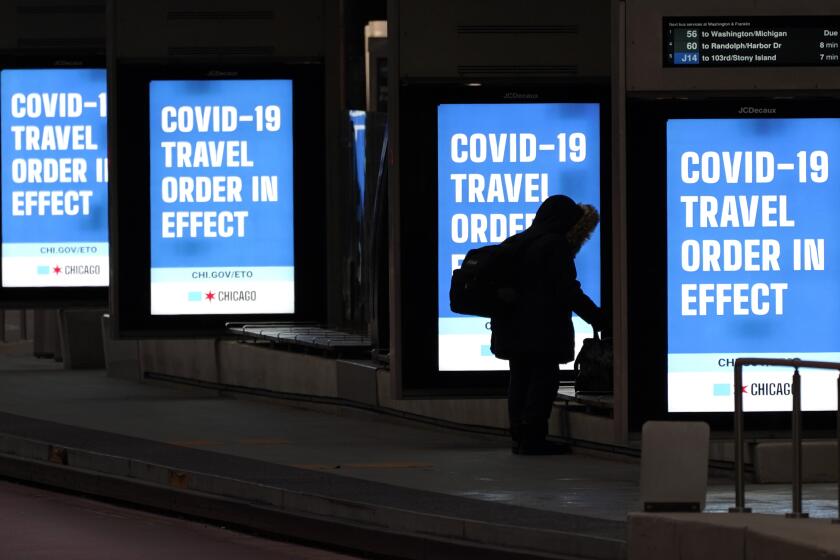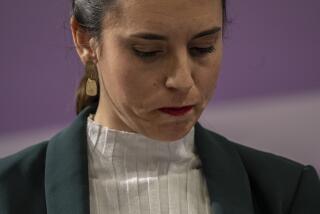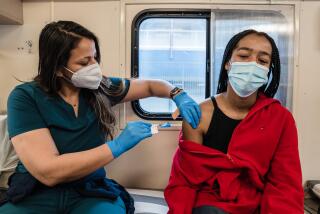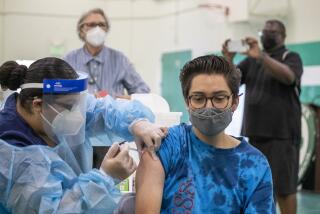Judge in Spain orders incapacitated woman to get COVID-19 vaccine

- Share via
BARCELONA, Spain — A judge in northwest Spain has overruled a family’s objections and decided to allow health authorities to administer a COVID-19 vaccine to an incapacitated woman in a nursing home.
The case appears to be the first known instance of a court in Europe requiring someone to get a COVID-19 vaccine. The Spanish government repeatedly has stressed that shots would be voluntary, as have authorities in other European countries.
In a ruling seen by the Associated Press on Wednesday, the judge for the court in the autonomous northwest community of Galicia recently ruled in favor of a request by a nursing home to override the refusal of the elderly resident’s family and to proceed with giving her the vaccine.
The resident was deemed by the nursing home’s medical staff to have suffered a cognitive loss to the extent that she “was incapacitated to provide valid consent,” according to the ruling.
Judge Javier Fraga Mandián said the court had the legal obligation to intervene in order to protect the woman’s health. He said his decision was not based on the welfare of other residents, but that the “existence of tens of thousands of deaths” from the coronavirus in Spain provided what he saw as irrefutable evidence that not taking the vaccine was riskier than any possible side effects.
The company that runs the nursing home, DomusVi, told the AP through its public relations agency that out of all the homes it manages throughout Spain, this was the only case of a family not wanting to vaccinate a resident who had been deemed incapable of making personal health decisions.
DomusVi said that 98% of the 15,000 residents in its nursing homes in the country agreed to receive the vaccine. It said the remaining 2% refused to get vaccinated — but unlike the woman, they were considered fit to make their own health decisions.
DomusVi said it sought the court’s intervention in the interest of the health of all the workers and residents at the Galicia facility.
British scientists have bolstered their case that the new coronavirus variant spreads more easily than its predecessors. It could be worse in the U.S., they warn.
Spain has administered over 581,000 doses of the Pfizer-BioNTech vaccine since it was authorized by the European Union in late December. Spain is also set to roll out its first batches of the Moderna vaccine.
Health Minister Salvador Illa said that Spain is seeing “a very low rejection of the vaccine.”
Nursing homes in Spain and across Europe have been devastated by the coronavirus, which spreads quickly among the elderly and individuals weakened by preexisting medical conditions. More than 25,000 people with COVID-19 are estimated to have died in Spanish nursing homes since the start of the pandemic.
Other court cases may be on the horizon.
In southern Spain, a state prosecutor said recently that any family members acting as legal guardians for incapacitated nursing home residents could lose their guardianship if they refused to allow their relatives to be vaccinated.
The Italian government approved a decree last week to explicitly authorize hospital chiefs and individual doctors to give inoculation consent on behalf of patients who cannot do so themselves. That includes nursing home residents who are incapacitated and without a guardian to give consent for them.
The procedure requires doctors to submit written documentation to a judge, who has 48 hours to approve or deny the request.
Nearly a dozen European countries have mandatory vaccination laws for diseases including polio, measles and diphtheria. But the laws are seldom enforced by the courts.
Americans’s interest in a COVID-19 vaccine is waning, with only 56% of adults saying they would get it if it were available. That’s down from 74% in April.
The World Health Organization has previously said it does not recommend making COVID-19 vaccines compulsory, fearing that could undermine public confidence in the available vaccines.
Dr. Kate O’Brien, who heads the WHO’s vaccines department, said she thought it would be better if countries created “a positive environment” for immunization as opposed to mandates. But O’Brien acknowledged that it might make sense in some high-risk environments, such as hospitals, to require staff members and patients to receive vaccines.
Some ethicists said the court’s decision to mandate the woman’s vaccination was probably justified by her high risk for COVID-19, given that she lives in an elder care home.
“The court has to look at the balance of probabilities, and if the woman is elderly, she has a far higher risk of dying from COVID than from a low-probability adverse event,” said Julian Savulescu, director of the Oxford Uehiro Centre for Practical Ethics at the University of Oxford.
Even in countries that don’t have mandatory vaccination laws, the state is obliged to protect people when those making decisions on their behalf may not be acting in their best interests.
“If you don’t vaccinate this woman and she dies of COVID, then people will be saying, ‘Why didn’t you protect her?’” Savulescu said.
More to Read
Sign up for Essential California
The most important California stories and recommendations in your inbox every morning.
You may occasionally receive promotional content from the Los Angeles Times.












